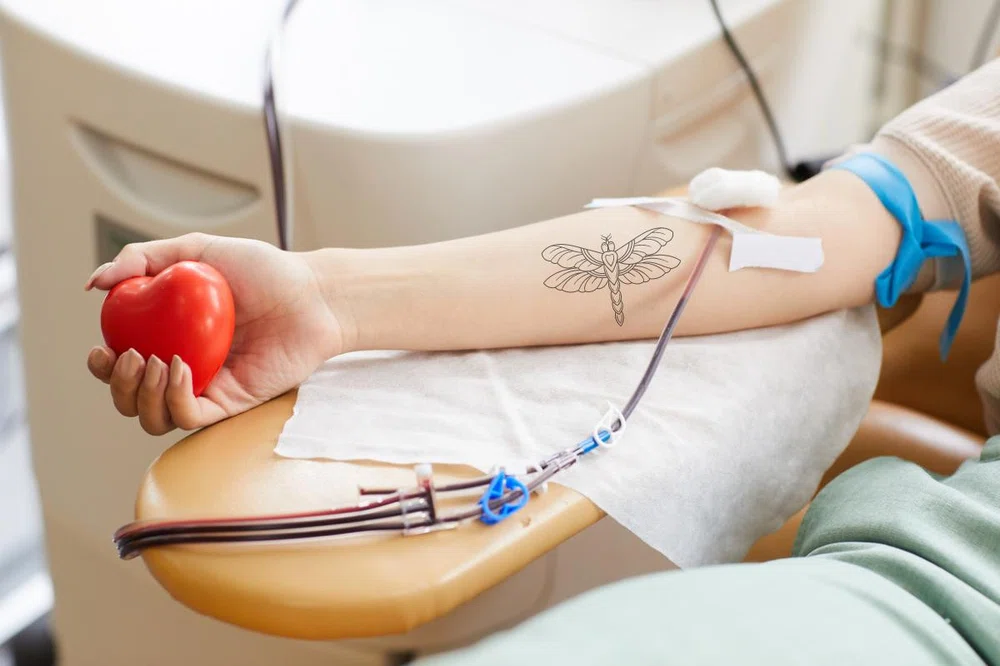Tattoos and blood donation: Unveiling myths
Artificial intelligence arrives in the world of tattoo
27 May 2024
Voluntary blood donation is a very important factor around the world.
This is why it is crucial to know if tattooed people are eligible to donate, as more and more people get tattooed nowadays.
9 out of 10 people will need a blood transfusion at some point in their life.
This procedure is essential to increase the quality of life of patients with high mortality rate diseases, it is also essential to face oncological treatments, surgical procedures and save people after an accident.
This enormous contribution to the health system is not the only one. After extracting 450 cubic centimetres of blood, donors benefit from this in terms of health. Cholesterol and triglycerides are reduced, blood is optimized and the functioning of the heart is improved as well as the lung capacity increases.
The reasons for donating blood are many and highly convenient, but before deciding to go to a hospital to make your contribution, you must take into account the requirements and restrictions in this regard.
Those people with lung, heart, bronchial, sexually transmitted, kidney diseases and others are not eligible for blood donation.
But… are tattoos an obstacle to being a donor? Find out here.
Can I donate blood if I have tattoos?
It has been long said that it is not possible for tattooed people to donate blood. The truth is that IT IS possible for tattooed people to donate blood.
Getting inked does not prevent you from being part of such an incredible act of solidarity.
Tattooing consists of the introduction of ink in the second layer of the skin, the dermis, through several needles.
As in piercings, if you follow the necessary care measures before, during and after its application, risks are reduced.
If you need to know more about how to follow the care measures, keep reading!

I just got a tattoo, when can I donate blood?
We have already confirmed that you can be a donor even if you have tattoos on your skin, but you cannot do it immediately. According to the Red Cross, you can do a bit later!
When is the right time? There is a 4-month period called the “window period”.
This stage refers to the time that passes from when a person gets infected, until that infection can be detected in a laboratory.
In other words, if one decides to donate blood within the window period, the pathology will not be detectable, therefore, the potential patients who receive from that donor may be at risk.
During the tattoo process, if the necessary precautions are not taken regarding disinfection and hygiene, potential diseases might be transmitted because the previous client's needle is reused.
Although the period mentioned is 4 months, there are countries where they require 12 months to be a donor after getting tattooed.
For our health and for that of whoever is going to receive our blood, it is necessary to follow preventive measures. What are they? Keep reading to know more
Care measures to get a tattoo
To be eligible to donate blood in perfect conditions as required by the health system, the tattoo artist must take several things into account:
- The correct cleaning and sanitization of the tattoo studio, and especially, of the area where the tattoo is going to be applied.
- Sterilization of non-disposable materials.
- Availability of disposable materials and ensure that they are opened in the front of the client, so that they can corroborate the hygienic measures.
- Be careful with the materials used when making the tattoo to prevent cross-contamination.
Clients must also follow the after-care measures once the tattoo session finishes.
- Cleanse the wound daily, as indicated by your tattoo artist.
- Avoid contact with contaminated elements, to prevent potential infections.
Conclusion: You can donate blood if you follow the right steps.
Now you know that tattoos do not prevent you from being generous with those who need it. You can make your contribution to save lives and get the subsequent benefits in your own body.
Do not forget to take into account the indicated periods and precautions. Donating blood is an act of solidarity, but it is also an important commitment and a great responsibility.
As you can see, the world of tattooing is full of myths. And it's up to you to be well-informed to advise your clients.
Do you have more questions to resolve? Within our professional tattoo courses, we guide you step by step not only in the technical aspects but also in the methodological and practical ones.